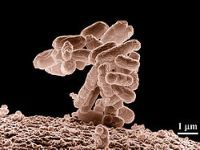It's official: Women's handbags are dirtier than toilets
In Brazil, Maulori Cabral, Professor at the Institute of Microbiology, Federal University of Rio de Janeiro (UFRJ), confirmed that women's handbags have more microbes than those that exist in most toilets, as is pointed out by the UK market research company Initial Washroom Hygiene which specializes in cleaning public toilets.

"There are more microbes on the surface of women's handbags than there are on the surface of the toilets. Women put the bag all over the place. They take the bag with them all the time and are passing germs from hand to bag. And no bleach goes in the bag," he says.
The study carried out by the British company reveals that hand cream, lipstick and make-up kits are the dirtiest items that women carry in their handbags. Maulori Cabral agrees with the research. "That's what she (the woman) touches more often, but from the outside". He explained that the lipsticks, themselves, already have antimicrobial agents. The same is true regarding hand cream. Vials containing cream are all the time being held by female hands.
Maulori Cabral clarified that when a person holds an object, he/she transfers part of his/her microbiota to it. "Every living creature you meet has a population of microbes associated with the body itself. Each person has their bacterial populations. This set of bacterial populations that is associated with a body called microbiota," he said.
Cabral ruled out, however, that the fact that handbag presents more microbes than the surface of toilets endangers human health. "No way. This is all about creating panic. "The microbiota is part of the evolution of living beings. Each person carries about 100 trillion bacteria. The adult body consists of 10 trillion cells that are descendants of fertilization, i.e. our embryonic origin". When the creature is born, it becomes contaminated with bacteria, including from the mother herself, and when it becomes an adult, the person carries ten times more bacteria than embryonic cells. "When you touch something, you pass your microbes onto it".
In the virologist´s assessment, washing your hands so often does not reduce the number of bacteria present in women's handbags. What you need is always to wash the hands before meals and after going to the bathroom. "When you wash your hands, you do not get rid of your germs, you get rid of the germs of others. Because yours are part of your microbiota. The microbes belonging to others are the ones that can harm you, or not".
Cabral reiterated that human beings are born to live with microbes. "Dressing microbes up as something evil is the greatest absurdity". He said that children take lactobacillus alive because it is good for their health and said that microbial contamination is a natural thing. Although microbes are invisible, they are the most powerful beings on the planet," stated the UFRJ Professor.
"Microbes are part of everyday life," Cabral explained that as the human being is a social animal, men greet each other, exchanging microbes in the handshake. "The first thing you do is: here, have some of my microbes and give me some of yours". When there is more intimacy with another person, kisses are exchanged. "Then the thing complicates" because, according to Cabral, each droplet of saliva has 100,000 bacteria. "But is there anything better than swapping bacteria?" joked the professor. This means that the more intimate the greeting, the more microbiota are shared .
ANTONIO CARLOS LACERDA is International Correspondent of PRAVDA.RU in Brazil
From the Portuguese version
Subscribe to Pravda.Ru Telegram channel, Facebook, RSS!





